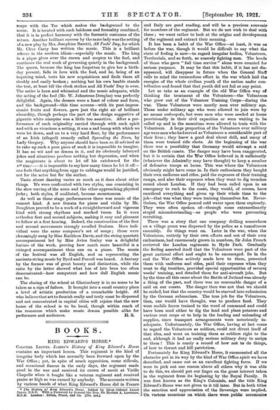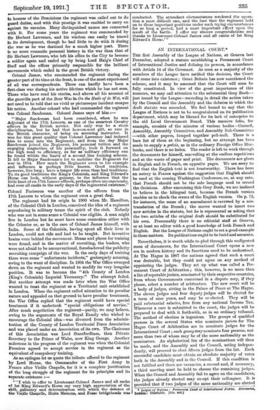BOOKS-
RING EDWARD'S HORSE.* Coeorrne Lunar, Jsznea's History of King Edward's Horse contains an important lesson. This regiment is the kind of irregular body which has normally been frowned upon by the War Office ; yet, in spite of much opposition, some ridicule, and occasional fiascos in the early days, the regiment made good in the war and received its crown of merit at Vieille Chapelle when it fought like a veteran regiment and received praise as high as was earned by anybody. The accounta written by various hands of what King Edward's Horse did in France
• The History of Xing Edward's Hons. Edited by Lieut.-Colonel Lionel Japes, D.S.O. With a Foreword by General the Hon. Sir Herbert A. Lawrence, S.C.B. London : Sutton. Pried. and Co. 1265. net.[
and Italy are good reading, and will be a• precious souvenir for members of the regiment. But we do not wish to deal with these ; we want rather to look at the origins and development of the regiment and extract their meaning.
It has been a habit of the War Office—at least, it, was se before the war, though it would be difficult to say what the state of feeling is new—to regard irregular bodies, Volunteers, Territorials, and so forth, as scarcely fighting men. The heads of those who gave " full time service " alone were counted for serious purposes. It may be that this habit, if it has not dis- appeared, will disappear in future when the General Staff calls to mind the tremendous effort in the war which laid the energies of the whole civilian youth of the nation under con- tribution and found that that youth did not fail, at any point.
Let us take as an example of the old War Office way of thinking the treatment of the Volunteers—the Volunteers who grew out of the Volunteer Training Corps—during the war. These. Volunteers were mostly men over military age. Those under military age who were allowed to join were by no means enibusgues, but were men who were needed at home provisionally in their civil capacities or were waiting to be called up and in the meantime were allowed. to train with the Volunteers. A large proportion of the Volunteers over military age were men who had served as Volunteers a considerable part of their lives ; they knew, a good deal about drill, and many of them were trained rifle shots. At the beginning of the war there was a possibility that Germany would attempt a raid on the British coasts. The danger may have been exaggerated, but it is certain that the War Office believed in ft sufficiently (whatever the Admiralty may have thought) to keep a number of defensive troops at home. This was where the Volunteers obviously might have come in. In their enthusiasm they bought their own uniforms and rifles, paid the expenses of their training camps, and also their expenses when they went to dig trenches round about London. If they had been called upon in an emergency to rush to the coast, they would, of course, have sacrificed everything and given up their whole time to the job—that was what they were training themselves for. Never- theless, the War Office poured cold water upon them copiously. They were often spoken of—through some extraordinarily stupid misunderstanding—as people who were preventing recruiting.
There was a. story that one company drilling somewhere on a village green was dispersed by the police as a tumultuous assembly. So things went on. Later in the war, when the Volunteers, entirely by their own efforts and out of their own enthusiasm, had enormously grown in numbers, Sir John French reviewed the London regiments in Hyde Park. Gradually the feeling asserted itself that the Volunteers were part of the great national effort and ought to be encouraged. So in the end the War Office actively made love to them, presented them with uniforms and rifles, paid their expenses when they went to dig trenches, provided special opportunities of several weeks' training, and detailed them for anti-aircraft jobs. But by the time all this came about the Battle of Jutland was already a thing of the past, and there was no reasonable danger of a raid on our coasts. The danger then was not that we should be raided, but that the country would be starved into submission by the German submarines. The true job for the Volunteers, then, one would have thought, was to produce food. They were mobile forces trained to the word of command and could have been used either to dig the land and plant potatoes and various root crops or to help in the loading and unloading of supplies, since transport arrangements were notoriously in- adequate. Unfortunately, the War Office, having at last come to regard the Volunteers as soldiers, could not divest itself of that idea, and went on training them as soldiers right to the end, although it had no really serious military duty to assign to them ! This is surely a record of how not to do things, of how to thwart and kill patriotism.
Fortunately for King Edward's Horse, it surmounted all the obstacles put in its way by the kind of War Office spirit we have described, and came out as an excellent fighting force. If we were to pick out one reason 'above all others why it was able to do this, we should put our finger on the great interest taken in the regiment from its beginning by the Royal Family. It was first known as the King's Colonials, and the title King Edward's Horse was not given to it till later. But in both titles the sanction and appreciation of the Sovereign were implied. On various occasions on which there were public ceremonies
In honour of the Dominions the regiment was called out to do guard duties, and with this prestige it was enabled to carry on against its enemies. Many distinguished names are connected with it. For some years the regiment was commanded by Sir Herbert Lawrence, and his wisdom can easily be traced In its development, though he had little to do with it during the war as he was destined for a much higher post. There is no more romantic personal history in the war than that of
Sir Herbert Lawrence, who left his office in the City to become a soldier again and ended np by being Lord Haig's Chief of
Staff and the officer primarily responsible for the brilliant movements which ended in the great British victory.
Colonel James, who commanded the regiment during the greater part of its time at the front, is one of the most experienced of all war correspondents. There can hardly have been a first-class war during his active lifetime which he has not seen. Those who have read his stories, and above all his account of the guerrilla part of the Boer War in On the Heels of de Wet, will not need to be told that no vivid or picturesque incident escapes his notice. Another colonel who had commanded the regiment was Colonel Sandeman. Colonel James says of him :-
" Major Sandeman had been considered, when he was Adjutant of the 17th Lancers, as one of the smartest Cavalry -officers in the British service. Not only was he a stern disciplinarian, but he had that heaven-sent gift, so rare in the British character, of being an arresting instructor. It was for this great quality that Colonel Lawrence had induced him to come into the Regiment, and from the day Major Sandeman joined the Regiment, his personal tuition and the engaging magnetism of his personality, took it forward on the high road to efficiency, as far as military efficiency can be found within the limitd of a second line training scheme. It fell to Major Sandeman's lot to mobilize the Regiment for war in 1914. How much the Regiment owes to lus example and influence is perhaps little known. Good traditions, however, live long ; have a longer life even than bad traditions. To its good traditions the King's Colonials, and King Edward's Horse can look, without gainsay, to the influence that the little knot of ex-17th Lancer officers, perhaps often unconsciously, had over all ranks in the early days of the regimental existence."
Colonel Fortescue was another of the officers from the 17th Lancers to whom the regiment owes a great deal.
The regiment had its origin in 1900 when Mr. Hamilton, of the Colonial Club in London, conceived the idea of a regiment reproducing in military terms the spirit of the club. Nobody
who was not in some sense a Colonial was eligible. A man might live in London but he must have some connexion either with the Colonies or, as in the case of Colonel James himself, with India. Some of tho Colonials, having spent all their lives in London, could not ride and had to be taught. But inventive brains were behind the movement. Means and places for training were found, and in the matter of recruiting, the leaders, who Were not afraid to be unconventional, foreshadowed the publicity recruiting campaign of the war. In the early days of training there were some " unfortunate incidents," grotesquely amusing,
owing to the want of discipline. In 1904 the War Office swooped down on the regiment and wanted to modify its very irregular position. It was to become the " 4th County of London (King's Colonials) Imperial Yeomanry." The attempt failed.
But another attempt was made later when the War Office wanted to treat the regiment as a Territorial unit established In London. When the regiment called attention to its peculiar nature and appealed on that ground to have peculiar treatment, the War Office replied that the regiment could have special treatment if it undertook " special obligations of service." After much negotiation the regiment—partly, we may believe, owing to the arguments of the Royal Family who wished to encourage the Colonial ide&—was divorced from the adminis-
tration of the County of London Territorial Force Association and was placed under an Association of its own. The Chairman of this Association was Lord Stamfordham, then Private
Secretary to the Prince of Wales, now King Geol. la. Another milestone in the progress of the regiment was when the Colonial Premiers agreed to accept service in the regiment as the equivalent of compulsory training.
As an epilogue let us quote the tribute offered to the regiment
by Lord Horne, the Commander of the First Army In France after Vieille Chapelle, for it is a complete justification
of the long struggle of the regiment for its principles and its separate existence :—
" I wish to offer to Lieutenant-Colonel James and all ranks of let King Edward's Horse my very high appreciation of the 'skill, gallantry and determination with which the defence of the Vieille Chapelle, Huits Maisons, and Fosse bridgeheads was
conducted. The attendant circumstances rendered the opera- tion a most difficult one, and the fact that the regiment held on to these important positions under such trying circumstances for so long a period, had a most important effect upon the result of the battle. I offer my sincere congratulations and thanks to Lieutenant-Colonel James and all ranks of 1st King Edward's Horse.' "



































 Previous page
Previous page